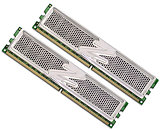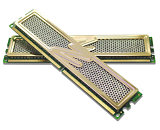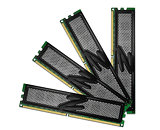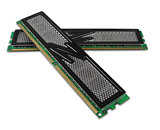News Posts matching #Vista
Return to Keyword Browsing

Addressing the never ending need for greater amounts of system memory, OCZ Technology Group, Inc., a worldwide leader in innovative ultra-high performance and high reliability memory, today announced all new "P45 Special" 4GB modules, a module density optimized specifically for Intel 's latest chipset. Available in 8GB dual channel kits and a special 16GB "quad kit," this new line of modules support the latest memory-hungry applications and games, offering superior performance gains. As an industry first, OCZ brings memory densities to the desktop segment that were reserved previously for high-end server configurations, offering a unique range of high-density kits to suit the varying requirements and budgets of everyday consumers.

If you have watched the TNT Original movie
Pirates of the Silicon Valley or read the book
Fire in the Valley, you would know Steve Ballmer to be quite a character although both the book and the movie are unauthorised documentaries. Under the leadership of Ballmer, Microsoft plans to start a US $300 million-worth campaign aimed to demystify Windows Vista and encourage users to adopt the new operating system.
These are good times for Apple. The lack of success for Windows Vista means growth in the sales of Apple Mac for first-time buyers. And it is true- numerous reports and surveys point out to the fact that Apple Mac is seeing a growth in sales of late. Add to that, Apple won't spare any chance to take pot-shots at the software giant, its 'bloated' operating system (as if Apple OS X isn't) in its series of TV and web-cast commercials around the 'cool Mac guy and uncool PC guy'.

Most would agree that Windows Vista's most obvious security feature, UAC, which asks a user for confirmation every time the computer decides to perform an administrative task, can become quite annoying. However, past whatever annoyance a user might perceive, it does have some very useful features. When a security firm pitted seven anti-virus suites against roughly 30 rootkit infections. Unfortunately, none of the programs found all of the rootkits. However, when tested on a Vista platform, Windows Vista's UAC actually prevented the rootkits from getting terribly mangled into the system, which made removal and detection a little easier. If nothing else, UAC kept the system more stable while the rootkit did its thing, and prevented a lot of damage from happening. In fact, when the security firm pitted the rootkit against Windows Vista UAC by itself, all of the rootkits were stopped right in their tracks.

A reporter and technology analyst for the Washington Post recently took a rather strong point of view regarding Windows Vista and XP. He accepts that Vista has it's flaws, such as "steep hardware requirements, its strict anti-piracy measures, its sometimes-intrusive security measures, its incompatibility with some older products." However, he points out that the current market behavior, which is something along the lines of "don't upgrade until Vista gets better, and beg to keep XP on shelves" is not doing Vista or Microsoft any good. He points out that XP is not a historic monument in need of preservation, and is more like an old car: it's had a good run, but in view of some XP flaws when compared to Vista strongpoints, it's time to move on. The analyst also pointed out that fundamental supply/demand economics is keeping Vista from rising to greatness. As long as the market holds on to XP, and refuses to move on to Vista, software makers will not see a very good reason to adopt or support Vista, which causes most of the problems Vista has today. You can read more details at the source link.

Microsoft today said that it would resume automatic distribution of the Servicing Stack Update (SSU) needed for installing Windows Vista Service Pack 1 (SP1). On February 12th, Microsoft first began pushing the Servicing Stack Update (SSU). While several million customers installed the updates successfully, many users reported endless restart problems with their PCs caused by the KB937287 SSU patch. This prevented them from successfully installing the Vista SP1. Microsoft then suspended automatic distribution of the SSU, until now. Starting from tomorrow, the fixed SSU patch will be available for automatic download via the Automatic Update feature on Windows Vista OS. The company also revealed more information today about the root cause of the endless reboots. "SSU has special code to check whether there are any pending reboots or other updates to install, ... If it sees either of these circumstances, it prevents the install from starting.", the
Microsoft Update Product Team Blog posted. "During our investigation, we discovered that there were a few unknown and rare events during the middle of the installation of the update that could cause the update to think it needed a reboot to complete the installation. If this happened, the system entered a repeating reboot loop." Continue reading the full post
here.

Data released by Microsoft has revealed that NVIDIA was responsible for 28.8% Windows Vista crashes during an unspecified period in 2007 - more than any other company. Microsoft itself was the next-worst offender, accounting for 17.9% of crashes, whilst AMD and Intel were much lower on 9.3% and 8.8% respectively. The cause of 17% of crashes is listed as being unknown, whilst other companies accounted for a total 18.5% of the crashes. The data was collected by Microsoft, and was ordered to be made public by a Judge regarding the ongoing "Vista Capable" lawsuit.

All Windows Vista users encountering problems when they upgrade to Service Pack 1 will be given free support, Microsoft informed today.
We are offering free-of-charge support to anyone who is having issues installing Windows Vista SP1,
Microsoft blogger Brandon Le Blanc said. There are three options available under the free support plan: e-mail support, which will be answered within one business day; online chat, which has a current waiting time of around 40 minutes; and call, available only for users who have a software-assurance agreement, professional contract, TechNet subscription, or MSDN subscription, or for those who come under the Microsoft Partner Program. The free support is available for all users till March 19, 2009. Please proceed
here.

The final version of Windows Vista Service Pack 1 is here! Microsoft Corp. posted the final SP1 package of updates today, and it's now available free for everyone.
Windows Vista Service Pack 1 (SP1)
32-bit version (434.5 MB) |
64-bit version (726.5 MB)

According to information posted on
Amazon.com and reports from TechARP.com that correctly called SP1's ship date last month, Microsoft will release Windows Vista Service Pack 1 next week to a wider audience. Amazon currently lists Vista SP1 retail copies as available next Wednesday, March 19, while
TechARP.com, the Malaysian Web site that nailed the update's release to manufacturing (RTM) date several days early, said users would be able to download SP1 starting Tuesday, March 18. Vista SP1 shipped to duplication and OEMs on February 4th, but since then it has only been available to previous beta testers, volume licensing customers and subscribers to IT subscription services. Hopefully, next week the long awaited Vista update will become available once and for all.

Microsoft has decided that Windows Vista isn't flying off the shelves quite as quickly as it would like and has issued a price cut for three of the retail versions of the software. The retail version of Windows Vista Ultimate will see its price fall by $80 from $399 to $319, and the upgrade versions of Vista Ultimate and Home Premium will have price cuts of $40 and $30 respectively, meaning they'll now set you back $259 and $129. The price cuts will apply to 70 countries world-wide (although figures may vary slightly), and will come into place with the introduction of Service Pack One for Vista. Microsoft has already sold over 100 million copies of the operating system since its release late in 2006, but sales have been hindered slightly by users preferring to stick with Windows XP rather than move to Vista.

Lawsuit filed against Microsoft's Vista Capable certification
A federal lawsuit has been filed against Microsoft, claiming that thier "Vista Capable" stickers are misleading. Many of the computers sporting them will only run Vista on the lowest, most basic settings. The lawsuit has been accepted by US District Judge Marsha Pechman. The issue is whether or not Microsoft tried to sell more "Vista Capable" computers by misleading customers.

Microsoft has published a list of programs that are currently incompatible with Windows Vista SP1 "Service Pack 1 for Windows Vista is an important update for Windows Vista. Windows Vista Service Pack 1 (SP1) contains many security, reliability, and feature updates for Windows Vista. A program may experience a loss of functionality after you install Windows Vista SP1. However, most programs will continue to work as expected after you install Windows Vista SP1."
Windows Vista SP1 Incompatible Programs
Microsoft's Windows Genuine Advantage software, which was designed to prevent piracy, is doing anything but. Cracks that get around, or even shut off, WGA are easily found by true pirates, while innocents are bagged for piracy when they've never even heard of the term. Fortunately, Microsoft has figured out how to make WGA friendly. Instead of WGA trying to use fancy code to find out if the Windows copy it is attached to is hacked, WGA will now search for the presence of common hacks, and only common hacks. This will drastically reduce the number of false flaggings, and make WGA a lot friendlier. Another large change is that the Vista version of WGA will no longer feature a "kill switch", or go into reduced functionality mode when WGA calls a hacked copy. Instead, there will be a long, politically-correct stream of dialog boxes that won't go away until you've validated. Microsoft made no mention of when this new, superior version of WGA will fly out factory doors.

It turns out that stability isn't the only problem Vista SP1 has with the world. There are plenty of products that simply won't work with Service Pack 1. Now wait a minute, you might ask. This has been going on since every operating system update from the beginning of computers, what makes this one so special? When the products are from big shots like Trend Micro, Zonelabs, BitDefender, and Novell, Microsoft is more than willing to consider delaying Vista SP1 to make sure that everything will work properly. While some products are fortunate, and merely have a couple glitches, the majority of the programs listed on Microsoft's great list of incompatibility won't even start properly. The main cause of this could be anything from coding differences in the kernel to being flat out blocked. Hopefully, Microsoft will fix this by the time SP1 is released.

Face it, the Windows XP code is reliable, practical, useful, secure and cost-effective. Most people, especially those in the business sector, simply don't see the need to upgrade to Windows Vista. It's no news that Windows XP Service Pack 3 is coming out soon. However, Microsoft may not have considered the effect XP SP3 may have on Vista sales. If a lot of users adopt XP SP3, they may be even less tempted to move on to Windows Vista, which is ultimately what Microsoft would like their customers to do. However, Microsoft may find that XP SP3 doesn't have any effect on Vista sales at all. After all, those who want Windows Vista will upgrade to Windows Vista, no matter what XP offers. Those who want to stick with XP will stick with XP, and may not even upgrade to the latest service pack.

Vista SP1 was recently handed out to some select testers, with mixed results. However, things took a turn for the worse when Microsoft tried to release one of the first updates to SP1. Update KB937287 will effectively freeze most computers caught trying to put it onboard. Most users who will get a problem don't see the issue until it is too late. There is a general consensus that users will see a certain "Configuring updates: stage 3 of 3 - 0% complete" error, and then get stuck in a reboot cycle. When Microsoft caught wind of this, they began an investigation. The report will determine how widespread the problem is, how to fix KB937287 and if this error can somehow be fixed. Until then, Microsoft has pulled the update before it can brick more computers. At this point, the best way to fix this is to stick in your Windows Vista install CD, and run System Restore from the CD. If you somehow manage to fix your PC, Microsoft urges that you turn off Windows Update until they sort out this whole mess.

Most of you know that Microsoft created a new Service Pack for Windows Vista, and is in the middle of getting it out to people. Some select testers, such as CNET, already have a copy of the final batch, and were obliged to give it a test drive. What they found confused and made people wonder why Microsoft worked so hard in the first place. While, yes, Vista SP1 is a lot more stable, and there are performance boosts in some areas, there are a sizable chunk of tests where Vista SP1 performed worse in than it's predecessor. The CNET tests concluded that while Vista SP1 definitely oozes with effort, most users will hardly notice the difference between vanilla Vista and Vista SP1. Most of the performance hits were seen when copying or transferring files. If you'd like to read the full review, please check out CNET
here.

The whole "Vista Capable" sticker scandal was a mess, pure and simple. However, new evidence has prompted a new anti-trust lawsuit against Microsoft. It would seem as though it's entirely plausible that Microsoft was indeed trying to pull a fast one past Vista customers. Everyone who was shopping for a PC, or used a relatively-new PC a couple months before the Vista release probably saw that it came with a "Vista Capable" sticker. The new evidence shows that Microsoft may have planted Vista Capable stickers on computers not ready to run Vista at all, be it the premium version or the normal version. Men from inside Microsoft did everything from reprimand members of marketing to scoff at retailers who sent letters of concern to Microsoft. We'll keep you posted on what exactly comes out of this lawsuit. If you bought a "Vista Capable" computer with a "Vista Capable" sticker on it, you may just qualify for a settlement if this case comes through for the prosecution.
In short, it has been a very bad week for Microsoft.

Microsoft has decided to end Windows Anytime Upgrade, the company's online method for upgrading basic Windows Vista distributions to the Premium and Ultimate versions of Windows Vista.
In an effort to streamline the Windows Anytime Upgrade experience for our customers and open the program to additional markets worldwide, Microsoft and its partners have decided to end digital product key distribution on February 20, 2008.
All digital keys purchased through February 20, 2008 will remain valid for upgrade. For additional information, please visit
Windows Anytime Upgrade Home.

The Gartner and The Burton Group, two highly respected groups of analysts, confirm what consumers have been saying for the past year or two: June 30 2008 is simply too early to stop printing new licenses of Windows XP. The analysts had this to say about any OS transition:
A good rule of thumb in any OS transition is that you have to have the original and new products available for at least two years to handle customer (migration) needs
Analysts over at Gartner explain why, exactly, Microsoft should be easing off the "upgrade your OS" button. While Microsoft does a fine job of ensuring as much application compatibility as possible, they simply cannot patch up every single application on the face of the planet, especially "home-brew" applications and applications from minor things. Pushing the cut-off date off by seven more months (so that the cut-off date would be two years after Vista was first released) would give everyone plenty of time for transitions.
There are a lot more reasons, which are just about all listed at the source link, if you're interested.

The folks over at Redmond are very serious when they say that they're trying to make Windows a product developed with a lot of user feedback. The 'Save XP' petition that we reported on yesterday got some recognition by Microsoft. Beating extreme improbabilities, and documenting one of the few times a petition actually does something, Microsoft acknowledged the users' concerns, and promised that fresh Windows XP licenses will be around as long as partners and customers feel like they need them. In the words of a Microsoft spokesperson...
We're aware of it, but are listening first and foremost to feedback we hear from partners and customers about what makes sense based on their needs. That's what informed our decision to extend the availability of XP initially, and what will continue to guide us.

For any of you hoping to get Windows Vista SP1 RTM code before it's officially ready, I suggest you head over to the source link for a detailed registry hack. Basically, this hack is a clever use of Microsoft's own code. At the run of a CMD file that was present in the latest beta version of Vista SP1, any version of Windows Vista will phone home and download whatever SP1 files it can find. Luckily for the adventurous, Microsoft will not be trying to shoot this hack down. In fact, they're happy that this time around, the hacking is completely legal, and safe. Safe, that is, until the upgrade is complete, after which you still are dealing with unfinished code.
If you understand the risks and want to play around, please follow the source link to download the appropriate files.

While Microsoft was getting very excited at the prospect of having a product ready to deliver, some people from QA had other thoughts. Apparently, Vista SP1 is not ready for prime time, and Microsoft does not think it will be ready until roughly March. Ironically, the thing that made QA think twice about unleashing Vista SP1 was a report declaring that Vista might have quite a few driver incompatibilities with current machines. And so, instead of finding themselves in the contempt of hundreds of thousands of gamers, hardware enthusiasts, and system integrators everywhere, Microsoft is working hard to make Vista SP1 a very competent product.

The 21 page document can be found in both XLS and PDF format.
Both can be downloaded from
Microsoft.
In case you don't feel like sifting through 21 pages of Microsoft's PR team at their finest, I took the liberty of summing up the summary. Basically, Microsoft took in a lot of user feedback, and mushed it into Vista Service Pack 1. Service Pack 1 addresses a ton of specific reliability and performance issues. Microsoft even went so far as to re-do the Vista kernel.

After hosting several public and private betas of Windows Vista SP1, it would seem as though the final code is finally ready. In fact, the code has supposedly been leaked and put on various torrents. When questioned as to whether or not the leaked code is final, Microsoft people didn't really have much to say. Regardless of whether or not pirates got a hold of SP1, Microsoft declared they made an RTM code earlier today. It is unclear whether or not they will release it today, but sources agree that a launch is imminent.
Return to Keyword Browsing








